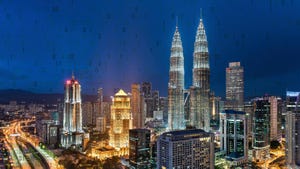Iceland's Renewable Power Play
For an industry consumed by the pursuit of electric power, Iceland presents almost the perfect profile. Iceland presents an interesting test of how far data centers will go for green energy, and the place of renewables in the site selection equation.
October 15, 2013


View of the Ljósafossstöð hydroelectric plant in Iceland. (Photo by Colleen Miller)
REYKJAVIK - Iceland is a land of mountains, geysers and waterfalls. Perched on the mid-Atlantic ridge, the island nation sits atop a natural powerhouse: the heat of the earth itself, which provides enough geothermal energy to heat most of the country's homes. Rivers and waterfalls drive hydro-electric power plants. On many days a fierce wind blows relentlessly, providing the potential for onshore wind power.
Data centers have been compared to enormous power sockets, connecting servers to the juice they need. For an industry consumed by the pursuit of electric power, Iceland presents almost the perfect profile.
There's just one problem with this vast supply of cheap, renewable power: you have to come to Iceland to get it. From New York, it's 2,600 miles. That's about a 5-hour trip by air, or about 40 milliseconds for data traveling over fiber through undersea cables. Iceland presents an interesting test of how far data center operators will go for green energy, and the place of renewables in the site selection equation.
The Aluminum Industry as a Template
Iceland has been pitching its renewable power to the data center industry for the past five years, seeking to replicate a template that helped it become a major production hub for the European aluminum industry. Recognizing the energy-intensive nature of aluminum smelting, Iceland was able to attract large plants from Alcoa, Rio Tinto Alcan, Century Aluminum and Elkem.
Those aluminum companies account for 80 percent of the power generated by Landsvirkjun, Iceland's largest power company.
The response thus far from the data center industry has been measured. The Reykjavik area is home to two multi-tenant data centers. Those providers, Verne Global and Advania, have put forth a model for a new type of data center featuring factory-built modular infrastructure, using free cooling and running entirely on renewable energy sources. Verne is working with modular designs created by UK provider Colt, while Advania (previously Thor) is using pre-fabricated units from Spain's AST Modular.
These providers have attracted a handful of name clients. BMW, Datapipe, RMS and CCP Games are hosting gear with Verne Global, while Opera Software is the marquee tenant for Advania.
Green, Cheap and Plentiful
Iceland's power pitch hinges on three hooks: an abundant supply, renewable sources, and predictable pricing.
With just 318,000 residents, Iceland's natural resources provide far more power than its population can use. It has the world's largest per capita power production, generating 54 gigawatt hours of electricity a year for each resident, according to national utility Landsvirkjun. About 75 percent of that total is hydro-electric power, with the remainder from geothermal sources.
Landsvirkjun projects that Iceland can scale its electric generation from the current 18 terrawatt hours (TWh) to 33 TWh by 2030. That's couting hydro and geothermal. Iceland also would seem to have an opportunity in onshore wind power, based on the almost constant gusty conditions encountered by visitors. The problem is that wind power is intermittent, and to add wind power capacity, Iceland's power industry would need to boost its hydro-electric capacity, which undermines the economics of adding wind power.
Iceland's renewable pitch comes as the data center industry is focusing more on energy sourcing, due in part to aggressive campaigns by Greenpeace seeking to prompt Facebook and Apple to move away from using coal-based electricity to power their huge data centers. Facebook subsequently built a data center in Sweden powered entirely by hydro-electricity, while Apple has added vast on-site generation of solar power and landfill-powered fuel cells.
Taking the Long View
One of the most appealing facets of Iceland’s green power play is the ability to arrange long-term contracts that can provide predictable power pricing for 12 to 20 years. Power in Iceland is available at 4.5 cents per kilowatt hour, with lower pricing available for bulk purchases. That’s an attractive pitch when you consider the potential for fluctuations in power pricing in countries like the U.S., Britain and Germany.
“We offer data centers the double benefit of going green while cutting costs," said Ragnheiður Elín Árnadóttir, Iceland’s Minister of Industry and Commerce. "We see a lot of potential with the data center industry, and it fits well with our goals. It’s jobs and it’s a way of selling our energy."
While it waits for customers to come to its energy, Iceland is working on shipping its energy offshore. National utility Landsvirkjun is working on technology to support a power connector to the UK, allowing it to export power more than 1,000 kilometers. It remains to be seen if the technology will work, as no connector has previously carrier power beyond 600 kilometers.
Iceland is keen to build a data center business, but realizes that it may not happen overnight. Lansdvirkjun began pitching marketing Iceland to the aluminum industry in the 1960s, and Alcan set up its first plant in 1969, noted Rikardur Rikardsson, the Director of Sales and Business Development for Landsvirkjun. Alcan expanded in the 1980s, but it wasn't until the period between 2000 and 2005 that Alcoa and Century Aluminum arrived.
Date Center Knowledge recently visited Iceland to get a close look at the country's renewable energy resources. See our photo features, see Hydroelectric: Using Water to Produce Electricity and Geothermal: Tapping the Earth's Heat for Energy.
About the Author
You May Also Like







